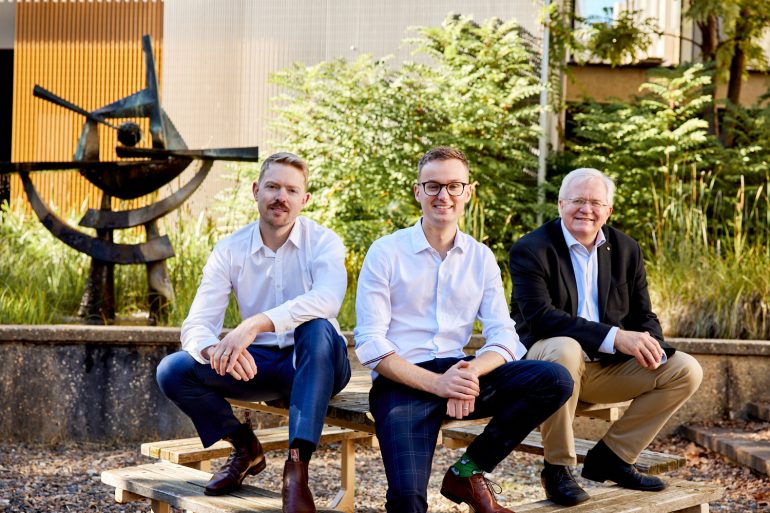Vai Photonics, a Canberra startup spun out of Australian National University last year to help vehicles navigate independently of GPS, has been acquired by Sydney tech company Advanced Navigation in a deal believed to be worth up to $40 million.
Founded by physicists Lyle Roberts and James Spollard to commercialise their research, Vai Photonics has a team of seven engineers building sensors that enable vehicles to navigate with precision and confidence when GPS is either unavailable or unreliable.
Sydney-based Advanced Navigation has been working in the same space for more than a decade and counts Airbus, Boeing, Google, Apple, and General Motors among its clients.
Advanced Navigation co-founder and -co-CEO Xavier Orr said the merger will see them focus on commercialising the Vai Photonics research into autonomous and robotic applications across land, air, sea and space.

Advanced Navigation co-CEOs and co-founders Chris Shaw and Xavier Orr
“The technology Vai Photonics is developing will be of huge importance to the emerging autonomy revolution. The synergies, shared vision and collaborative potential we see between Vai Photonics and Advanced Navigation will enable us to be at the absolute forefront of robotic and autonomy driven technologies,” he said.
“Photonic technology will be critical to the overall success, safety and reliability of these new systems. We look forward to sharing the next generation of autonomous navigation and robotic solutions with the global community.”
A major challenge
Spollard, Vai’s CTO, said precision navigation when GPS is unavailable or unreliable is a major challenge for autonomous systems.
“Our emerging photonic sensing technology will enable positioning and navigation that is orders of magnitude more stable and precise than existing solutions in these environments,” he said.
“By combining laser interferometry and electro-optics with advanced signal processing algorithms and real-time software, we can measure how fast a vehicle is moving in three dimensions. As a result, we can accurately measure how the vehicle is moving through the environment, and from this infer where the vehicle is located with great precision.”
They’ve been working on the technology for more than 15 years at ANU, to solve complex autonomy challenges across aerospace, automotive, weather, space exploration as well as railways and logistics. Its applications range from electric vertical takeoff and landing systems for flying taxis to space exploration.
His co-founder and the startup’s CEO Dr Roberts said it was a huge win for the team, which will now be able to bring its product to market sooner than originally planned.
“We now have access to leading research and development facilities along with strong distribution channels. We couldn’t have asked for a better outcome and look forward to navigating the future with Advanced Navigation.”
ANU Vice-Chancellor Professor Brian Schmidt said Vai Photonics is another great example of how fundamental research – thinking that pushes the boundaries of what we know – translates into life-changing technology.
“The work that underpins Vai Photonics’ advanced autonomous navigation systems stems from the search for elusive gravitational waves – ripples in space and time caused by massive cosmic events like black holes colliding,” he said.
“The team have built on a decade of research and development across advanced and ultra-precise laser measurements, digital signals and quantum optics to build their innovative navigation technology. We are proud to have backed Vai Photonics through our Centre for Gravitational Astrophysics and business and commercialisation office. It’s really exciting to see the team take another major step in their incredible journey.”
The acquisition finalised last month and the Vai Photonics team has been integrated into Advanced Navigation’s research and development team, at a new Canberra research facility.
NOW READ: Canberra software startup Instaclustr is being acquired by Nasdaq-listed US tech giant NetApp




















Trending
Daily startup news and insights, delivered to your inbox.